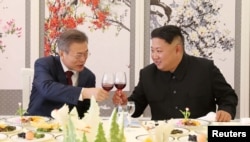President Donald Trump's dual policy of exerting pressure while engaging in dialogues to denuclearize North Korea faces challenges, as momentum builds toward a second summit with North Korean leader Kim Jong Un.
At the U.N. General Assembly, Trump praised Kim while saying sanctions imposed on North Korea would remain in place.
"I would like to thank Chairman Kim for his courage and for the steps he has taken, though much work remains to be done," Trump said. "The sanctions will stay in place until denuclearization occurs."
After last week's third inter-Korean summit, Kim said he would dismantle the Yongbyon nuclear facility if the U.S. took "corresponding measures."
On Monday, at the first meeting of the U.N. gathering, Trump said a second summit with Kim would take place "quite soon." To prepare, Secretary of State Mike Pompeo plans to visit Pyongyang next month at Kim's invitation, which was delivered Wednesday by North Korean Foreign Minister Ri Yong Ho.
Washington's accelerated effort to resume talks with Pyongyang came after Trump in August canceled a Pompeo trip to North Korea. At the time, Trump cited a lack of progress in denuclearization talks.
More pressure
The renewed effort also came after Washington took steps to pressure Pyongyang, such as issuing new U.S. sanctions on North Korean front companies in China and Russia, and calling an emergency U.N. Security Council meeting earlier this month.
According to Dennis Wilder, a former National Security Council senior director for East Asian affairs during the George W. Bush administration, Trump's binary efforts to strengthen sanctions and resume dialogues are complementary strategies for denuclearizing North Korea because the pressure will induce Pyongyang to negotiate on denuclearization.
"If you don't keep pressure on North Korea, if you don't make it clear that there are consequences for backsliding, they will," said Wilder. "When I was negotiating with them in 2006, we saw a similar problem. We took the pressure off sanctions, [and] they were less willing, not more willing, to negotiate."
However, developments in inter-Korean ties may weaken Trump's effort to pressure North Korea.
A week before arriving in New York for the General Assembly, South Korean President Moon Jae-in held his third summit with Kim, and through the newly issued Pyongyang Declaration, they renewed their commitment to achieving peace in the Korean Peninsula by formally ending the Korean War. The war ceased with an armistice rather than a peace treaty in 1953. The United States, China, North and South Korea signed the armistice.
Moon also announced Seoul would resume economic cooperation projects with Pyongyang to foster prosperity and reconciliation of the two Koreas.
North-South progress
Robert Manning, a senior fellow at the Atlantic Council, a global affairs think tank in Washington, said that Trump's "maximum pressure" campaign had compelled Pyongyang to discuss denuclearization with Washington but that inter-Korean progress had stymied his effort.
"Maximum pressure on North Korea squeezed its economy and enabled moves to dialogue," Manning said. "Continued progress on North-South reconciliation and cooperation will make it exceedingly difficult to reimpose maximum pressure if diplomacy does not achieve ample results."
Evans Revere, a former State Department official who negotiated with North Korea extensively, also believes Trump's policy of "maximum pressure" is a powerful strategy to denuclearize North Korea. But, said Revere, Trump's own comments on North Korea have severely debilitated Washington's effort.
"If President Trump and his administration were actually to pursue a robust, highly coordinated, massive pressure campaign against [North Korea], it would compel Pyongyang to make a critical choice: Agree to denuclearize or suffer severe economic, political and diplomatic damage," Revere said.
"Unfortunately, the 'maximum pressure' campaign is rapidly losing steam. It has been undercut by the president's comments that the threat is over — it is not; that North Korea is denuclearizing — it is not; and that the United States is in no hurry when it comes to seeing [North Korea] denuclearize," Revere said.
'Zero-sum game'
Ken Gause, director of the International Affairs Group at the Center for Naval Analyses, a research-and-development group serving U.S. defense agencies, thinks "Trump's instincts are right" in engaging with Pyongyang. However, he said continuing the pressure campaign while demanding that North Korea denuclearize upfront would tie Washington's hands because it creates "a zero-sum game" with an "absolute winner" and an "absolute loser" that will not appeal to Pyongyang.
"If there is any hope of completely getting rid of the nuclear program, they will have to see major sanctions relief at the end of the 'maximum pressure' strategy well before they give up everything that they have in terms of a nuclear program," Gause said.
Moon has been hinting that declaring peace on the peninsula, a move that will eventually lead to a peace treaty, is one of central "corresponding measures" that North Korea wants to move forward on.
"It's going to take, probably, finally signing a peace treaty [and] other security guarantees which directly guarantee the security of the Kim family, in addition to a lot of economic assistance and aid," Gause said.
After Pompeo met with Ri Yong Ho on Wednesday, Trump said he did not have a time frame for achieving the denuclearization of North Korea, stating, "We're not playing the time game."






